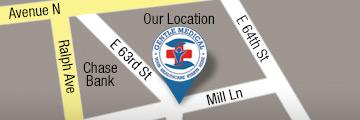How I Diagnose and Treat Irregular Heartbeat (Palpitations, Arrhythmias)
Posted by admin on July 6th, 2013

“Experiencing an irregular heartbeat can be frightening. Your heart may pound, skip beats or beat very quickly, which can definitely make you feel anxious! If you experience an irregular heartbeat, especially if it is happening for the first time or is happening frequently and you have risk factors for heart disease, such as a family history of heart disease, hypertension or diabetes, I want to see you. Although occasional palpitations can be normal, they can also signal a heart problem”.
-Dr. Zimilevich, MD
Most of us, if not all of us, have felt our heart skip a beat, a fluttering sensation in our chest or the sensation that our heart is turning over. Palpitations (rapid, fluttering, skipped or irregular heartbeats) are not uncommon as we age. When they occur rarely and stop almost before they start, they are probably nothing to worry about. However, some irregular heartbeats can be dangerous and there is no way you can tell if the weird sensation you are experiencing is benign or a symptom of a serious problem. That’s why it’s best to come and see me if you are experiencing palpitations.
Symptoms of an arrhythmia
The term arrhythmia (sometimes called dysrhythmia) refers to a change in the way your heart normally sends electrical impulses that result in contraction of your heart muscle. Electrical impulses may happen too slowly, too quickly or very irregularly. When the heart doesn’t beat normally, it may not pump blood efficiently to the rest of your body, resulting in abnormal symptoms. If your heart fires prematurely, you may notice a skipped beat. Premature beats that occur rapidly and in succession may cause a fluttering sensation in your chest. When an arrhythmia continues for more than a few beats you may experience:
- dizziness/lightheadedness
- rapid heartbeat or a pounding in your chest
- sweating (diaphoresis), cool clammy skin
- chest pain or shortness of breath (which may be more pronounced if you have underlying heart disease)
- tiredness or fatigue
- fainting or near-fainting spells (known as syncope or near syncope)
- cardiac arrest or collapse, depending on the arrhythmia
What are risk factors for irregular heartbeats?

- older individuals- the incidence of palpitations increases with age, even in the absence of heart disease
- prior heart attack- the scar tissue that forms after a person has suffered a heart attack can make them more prone to conduction abnormalities
- electrolyte imbalances- the heart depends on potassium, sodium, magnesium and calcium to function properly. When levels of electrolytes are too high or too low, the heart may beat too slowly, too quickly or irregularly
- chemicals- caffeine, alcohol, recreational drugs and certain medications (including heart medications) may cause an abnormal heart rhythm
- chronic health conditions- heart failure, diabetes, high blood pressure, lung disease and congenital heart defects may cause rhythm abnormalities
How are abnormal rhythms diagnosed?
When you come in to see me complaining or an irregular heartbeat, I will ask you about your health history, including any history of heart disease in your family. I will ask in detail about the symptoms you have been experiencing- when you noticed them, how long episodes last and the symptoms you have experienced. I will perform a physical exam (you may need to change into a gown for this), listening to your heart and lungs, checking pulses in different areas and looking for abnormal swelling in your legs and feet. I may order blood work or other diagnostic tests such as an ECG, which provides a detailed tracing of your heart and can detect rhythm abnormalities. Depending on what I find, I may prescribe medication or refer you to additional doctors if necessary. It’s important to add that if you are experiencing severe chest pain or shortness of breath, you should go to the nearest emergency room, preferably by ambulance.
If you have been experiencing irregular, rapid or skipped heart beats frequently and you are concerned, it’s best to make an appointment to come in and see me. Although the occasional skipped beat is generally nothing to worry about, irregular heartbeats can be serious and should be investigated.
Our Location

6301 Mill Lane, Brooklyn, NY 11234.
(718) 942-4600



